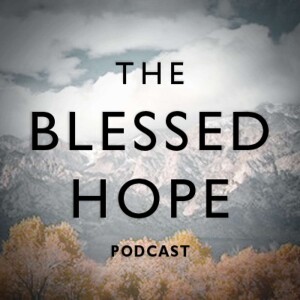
The Blessed Hope Podcast -- with Dr. Kim Riddlebarger
Religion & Spirituality:Christianity

Eschatology by Ethos (8-40): Why Optimism and Pessimism Do Not Work as Eschatological Categories
 2023-10-26
2023-10-26
Episode Synopsis:
The first time I heard the term “optimistic amillennarian” was in seminary, when a student asked one of the professors whether they were postmillennial or amillennial. The professor said he admired much about postmillennialism, but thought amillennialism was the biblical view. But after saying that, he blurted out, “well, maybe, I’m optimistic Amillennial.” That started quite a discussion among the students, with the postmillennial students pressing the amillennial students to give up their “pessimistic eschatology” and do as the professor had done, declare themselves to be eschatological optimists, presumably the first step on the way to becoming postmillennial. I was one of those present who still hadn’t figured out how my newly-found Reformed convictions were going to influence my views on eschatology. The only thing I was sure about was that I could not remain a dispensationalist.
I did indeed give up my premillennialism and dispensationalism for amillennialism and have spent much time writing, teaching, and discussing why I made the move. Over time I thought that I had managed to distance myself from my dispensational past, and I worked hard to replace my dispensational hermeneutic with a covenantal approach to Scripture.
Yet there was one tie which still bound me to dispensationalism–the postmillennal charge that both schools of thought (amillennial and dispensational premillennialism) were intrinsically “pessimistic,” while only postmillennarians have an eschatology of “essential optimism.” This always struck me as odd, since as an amillennarian I believe that the kingdom of God is victorious over unbelief and all the forces of the devil, that the gospel will spread to the ends of the earth because God is sovereign over all things. But I remain pessimistic about the city of man which will destroyed in the end when Jesus returns to raise the dead, judge the world, and make all things new.
Both amillennialism and postmillennialism contend that the scene in Revelation 20:1-10–the only place where a period of a thousand years (or a millennial age) is mentioned in Scripture–occurs before Christ returns, not after, as in premillennialism. This means that structurally speaking, amillennialism and postmillennial are very similar. The two views have coexisted from time of the apostolic age, usually identified as non-chiliastic (non-millenarian). It wasn’t until early in the 20th century that the two views (amillennialism and postmillennialism) were distinguished from one another as distinct eschatological positions. Both have existed together from the time of the Reformation–the differences centering around the timing, duration, and character of the millennial age.
As we will see, in the 1970's things changed. So where did the optimism-pessimism categories come from? Do they accurately describe the three main eschatological schools of thought? Might they even be misleading? And therefore not helpful? That’s my take . . .
For show notes and other recommended materials located at the Riddleblog as mentioned during the Blessed Hope Podcast, click here: https://www.kimriddlebarger.com/
More Episodes
Create your
podcast in
minutes
- Full-featured podcast site
- Unlimited storage and bandwidth
- Comprehensive podcast stats
- Distribute to Apple Podcasts, Spotify, and more
- Make money with your podcast
It is Free
- Privacy Policy
- Cookie Policy
- Terms of Use
- Consent Preferences
- Copyright © 2015-2024 Podbean.com





